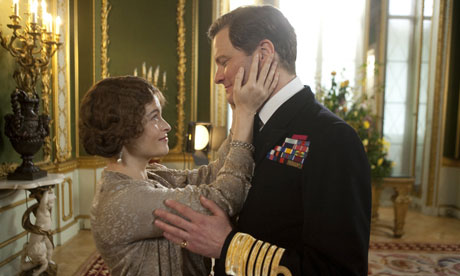
Marrying kind ... Helena Bonham Carter and Colin Firth in The King's Speech
George VI's wartime newsreel appearances, we're told, were regularly interrupted by applause from cinema audiences – a phenomenon no more common now, at least for British filmgoers, than it was at the time. All the more peculiar, then, that The King's Speech – the box-office smash starring Colin Firth as the same monarch struggling to overcome his debilitating stutter – is getting the same reception. When I saw it at the Odeon Camden on Friday, there was a spontaneous ovation at the end. A quick straw poll of friends and a click around Google makes clear that this is happening at many screenings. So what's going on?
The most straightforward answer is that it's a very good film, telling the well-filmed, well-acted story of a sympathetic character overcoming a daunting challenge. But other films match or better this accomplishment without stirring such a visceral response. My guess is that The King's Speech taps into something more deeply, resonantly British, something that speaks to culturally ingrained notions of shared adversity and earned deference around the royal family.
The current period of economic hardship had barely begun before comparisons were being made to the spirit of the Blitz and stiff-upper-lip perseverance. The outstanding example is probably the revival of the second world war "Keep Calm and Carry On"" poster, of which much of the publicity for The King's Speech is strongly reminiscent. And cannily so: the folk memory of the king and queen staying in London throughout the war remains the benchmark of respectful popular affection for the house of Windsor.
Of course, 70 years ago there was no question that such affection was conditional on vicarious intimacy with the royals themselves. Diana and celebrity culture changed all that, and The King's Speech lets us get to know the private Bertie rather than the public George – and crucially to feel his pain, to see the emotional struggle behind the stiffest upper lip in history. Like Helen Mirren's Elizabeth, not to mention Diana's entire public life, Firth's Bertie opens up an imaginative space in which royalty is something that happens to human beings.
However successful such enterprises might be in fostering good feeling, they do not, of course, offer actual access to the royals. Applause is how the faceless crowd communicates with them. When it applauded George VI after his speech at the outbreak of war, it was confirming they had struck the right tone. When it applauded Earl Spencer's eulogy for his sister in 1997, it was telling them they hadn't. What does the applause for The King's Speech signify? Perhaps you've heard it yourself and have an idea. I wonder if it expresses an appetite for leadership – for a figurehead able to convince us that he or she is a sympathetic human being who feels our pain and will offer principled guidance in times of adversity.
Take this alongside the extraordinary popular excitement that the engagement of Prince William and Kate Middleton is already generating and you'd be excused for thinking the Windsor PR machine is looking at an open goal. It is presumably aware of the potency of the memory of the royals in times of hardship and austerity. (Is it coincidence that the Royal Collection referred to "austere times" in its announcement that it wouldabsorb the VAT rise on wedding memorabilia?) The current climate seems to have stoked affection rather than resentment towards the royals – perhaps because they offer reassuring consistency at a time of upheaval, when the government is disappointing even its own supporters and the opposition is all but invisible.
Quite an opportunity, then. Wills and Kate currently have next to no public identity and a minimal public role. We have little idea of their personalities – especially compared to that of Wills's parents at the same age. It's hardly surprising that they have no appetite to cultivate the kind of celebrity persona associated with Diana. But the response to their engagement suggests huge reservoirs of public interest in the royal family, and the response to The King's Speech suggests a readiness to root for and salute them if they are seen to be ready to do their duty as national figureheads, willing to make sacrifices and able to rally the nation. If Wills and Kate can convince enough of us they are helping to make people's lives better (through charitable work, perhaps?), the royal family might earn itself a generation of ovations.


 12:07 AM
12:07 AM
 Wikipedia
Wikipedia

 Posted in:
Posted in: 

0 comments:
Post a Comment